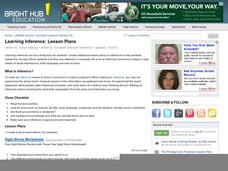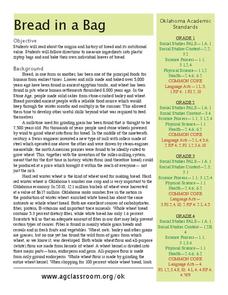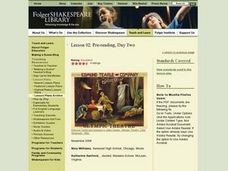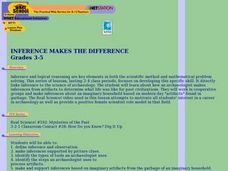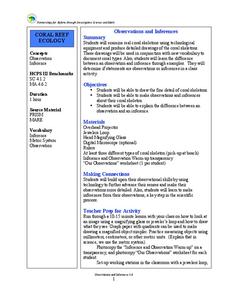Curated OER
Learning Inference
Making inferences can be a tricky proposition for middle schoolers. In the lesson presented here, pupils practice the skill of drawing a conclusion and making a judgment - which are what making an inference is all about! There are five...
NOAA
Journey to the Unknown
What's it like to be a deep-sea explorer? Tap into the imaginations of your fifth and sixth graders with a vivid lesson, the second part of a six-part adventure. Learners close their eyes and submerge themselves in an expedition aboard...
Teaching Tolerance
Using Photographs to Teach Social Justice | Affirming Our Commonalities and Differences
Photos can challenge stereotypes. To gain an understanding of the big picture, groups examine a series of photographs and analyze how a photographer's choices can shape a viewer's reaction to an image. For the first set of photographs,...
C-SPAN
Choice Board: Expressed and Implied Powers
Article 1, Section 8 of the United States Constitution expressly lists powers given to Congress. Over the years, lawmakers have expanded the enumerated powers to include powers implied by the list. To better understand the significance...
Curated OER
Call It a Hunch
Give young scholars a chance to practice making inferences after reading the book Through My Eyes by Ruby Bridges. They confirm whether or not their conclusions are true, have a class discussion, and then independently complete an...
Curated OER
Lessons in Looking: Contraband in Paintings
Using the paintings On to Liberty and A Ride for Liberty, 10th graders analyze historical perspectives on life after the Civil War. They attempt to determine what the Civil War meant for free slaves, then read a paragraph highlighting...
Curated OER
Bread in a Bag
Could the history of bread really be interesting? Yes, it could! An informational text gives scholars wheat production background from 8,000 years ago, discussing different types of bread and the current industry in Oklahoma. Learners...
Curated OER
Book Discussions in a Reading Partnership
Do you have a lot of different reading levels in your class? Pair kids up by level and have them choose a book to read independently. They will make predictions, ask questions, make connections, etc. Consider creating a general reading...
Curated OER
Shakespeare: Julius Caesar
Before your high schoolers read Julius Caesar, have them complete this thought-provoking activity! To familiarize them with some of the play's most important lines, break the class into pairs and have them create a skit around two lines...
Curated OER
Analyzing Atmosphere: Macbeth Murder Scene and Dagger Speech
Shakespeare's Macbeth (Act II, Scenes I and II) lacks explicit details of the murder of King Duncan, yet the author creates an atmosphere that allows us to visualize the event. Readers interpret the "Dagger Speech" by writing stage...
Curated OER
Mixed Up Chameleon
Students discover facts about chameleons. In this adaptations lesson plan, students read a book about chameleons and discuss the adaptations they have to survive. Students also discuss predator and prey of the chameleon. Students make...
Curated OER
Inference Makes the Difference
Students explore how archaeologists make inferences from artifacts to explore what life was like in the past. In this archaeology lesson, students work in groups and make inferences about an imaginary household based on modern day...
PBS
Blue Ribbon Readers: Drawing Inferences
Model for young readers how to use illustrations, chapter titles, and events in a story to draw inferences and make predictions. Learners then practice these essential comprehension strategies by drawing inferences for another section of...
National Park Service
A Tale of Two Men
Theodore Roosevelt and the Marquis de Mores were both born in 1858, and both came to the Dakota territory in 1883, but they influenced the developing country of America in different ways. Elementary and middle schoolers apply written and...
American Physiological Society
Did I Observe it or Infer it?
Take the mystery out of inquiry! When young scientists learn to use their keen powers of observation to make smart inferences about a situation, they are well on their way to understanding what the scientific method is all about. Using...
NOAA
Animals of the Fire Ice
When the sun's rays can't reach the producers in a food web, where does all the energy come from? Extreme environments call for extreme food sources. Young scientists investigate creatures that appear to get their energy from methane...
NOAA
The Oceanographic Yo-yo
How does chemistry help deep-sea explorers? Part four of a five-part series of lessons from aboard the Okeanos Explorer introduces middle school scientists to technologies used in ocean exploration. Groups work together to analyze data...
EngageNY
Mid-Unit Assessment: Evidence and Inference in Pygmalion
Scholars complete the Pygmalion mid-unit assessment to show their progress toward the unit's stated goals. The assessment requires learners to read text and successfully answer multiple choice and extended response questions.
Curated OER
Observations and Inferences
Learners observe how to distinguish observations form inferences. For this examining inferences lesson students list observations relating to the activity and discuss the importance of them.
Curated OER
Observations and Inferences
Students examine coral skeletons. In this science lesson plan, view real coral skeletons. Students explain the differences between an observation and an inference. Students draw a coral skeleton.
Curated OER
Inferring Themes
Fifth graders practice making inferences on various types of reading material. As a class, they develop a definition of the word "theme" and discuss themes for some of their favorite stories. They use the context of the reading...
Curated OER
Inferences/Opinions
Fourth graders practice making inferences and forming opinions. In this reading strategy lesson, 4th graders listen to the book Woodsong by Gary Pauisen. They make predictions about the story before beginning and discuss the story as...
Curated OER
Decision Making
Students study weather patterns and learn to make decisions based on the weather. In this weather lesson, students plan a potluck based on the weather. Students use a decision tree to brainstorm about the activity. Students complete a...
Curated OER
Making Predictions by Analyzing Key Ideas and Details
Pupils make predictions. In this language arts instructional activity, students read nonfiction texts and make predictions about what they are going to read. Pupils confirm and revise their predictions as they read the text.
Other popular searches
- Making Inference in Math
- Teaching Making Inference
- Making Inference Handout
- Making Inference Using Art
- Making Inference Worksheet
- Inference and Prediction
- Making Inference Review Game
- Making Inference Lessons
- Lesson on Making Inference
- Making Inference Using Coin
- Making Inference: Reading
- Making Inference Seuss


